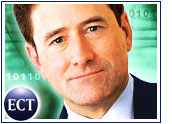
PeopleSoft on Thursday reported earnings that paint a mixed picture, with revenue up but net profit down as a result of charges related to its J.D. Edwards acquisition.
Revenue in the fourth quarter reached US$685 million, including $185 million in license revenue. Of that amount, $112 million, or 15.3 percent of total revenue, went to the bottom line in operating income, up from $89 million, or 13.2 percent, in the third quarter. For the full year, revenue of $2.3 billion was up 16 percent over 2002’s total.
However, fourth-quarter profits plunged 70 percent.
J.D. Edwards Effects
PeopleSoft, headquartered in Pleasanton, California, appears to have retained its customer-centric focus throughout the year, which was not a calm one. The company completed the acquisition of J.D. Edwards in September 2003 for $1.7 billion and also found itself being chased by Oracle, which made an unsolicited $7.3 billion takeover bid for PeopleSoft.
While the J.D. Edwards acquisition decreased PeopleSoft’s short-term profits, it may strengthen the company against the Oracle bid. “Most application software acquisitions have [involved] an old, tired software company,” Brian Sommer, vice president of research services at Boston-based Aberdeen Group, told the E-Commerce Times. “This J.D. Edwards deal was very different, with both companies still in the prime of their product life cycle.”
“The real news with PeopleSoft is continued discussion of their acquisition of J.D. Edwards,” agreed Louis Columbus, a senior analyst at AMR Research, in an interview with the E-Commerce Times. “It has galvanized their customer base into a new level of customer loyalty, and you can’t discount that.”
Customer Satisfaction
For his part, Aberdeen’s Sommer said PeopleSoft has made good use of its J.D. Edwards acquisition. “PeopleSoft seems to beat the odds in integrating the two product lines in a short amount of time,” he noted. “Users were not twisting in the wind wondering whether their product [would] be integrated. The company has moved mountains to integrate the product lines, already providing benefits to existing and future customers.”
Also, PeopleSoft’s recent price drop on its application hosting service, by as much as 20 to 30 percent, is seen as a move to attract price-sensitive mid-market customers. Many companies are finding they can hold on to customers in a tough market by offering a hosting model, thereby attracting new customers eager to focus on their own customer retention rather than on software management.
Oracle in Hot Pursuit
PeopleSoft is not exactly David — with more than 12,000 customers in more than 25 industries and 150 countries, it is the world’s second-largest provider of enterprise application software — but a Goliath is looming with this summer’s unsolicited bid by Oracle to acquire the company. Action is pending for at least another month as the U.S. Department of Justice (DOJ) prepares to rule on an antitrust inquiry in the takeover.
While an unsolicited takeover offer could cause any company to lose focus, it instead may have helped PeopleSoft dig a little deeper in its conviction. “They are learning how to compete in a world where 2004 will be a year of consolidation in much of software industry. Craig Conway is a very strong CEO,” Columbus said. “He understands what he needs to do to compete. Their strong results are a testament to their ability to stay focused in the face of a lot of potential distractions.
“It takes a good hard challenge for a company to realize who they want to be and how badly they want to be it,” he said. “Conway had them well on their way before, but it took something like this to wake them up.
“PeopleSoft sidestepped a lot of potential mistakes and learned to interpret market dynamics well,” Columbus added. “Conway and his team deserve credit despite everything that’s going on.”
Challenges Ahead
Despite positive fourth-quarter results, the future is far from crystal-clear for PeopleSoft. Executives at the company said seasonality will cause first-quarter 2004 license revenue, a closely watched measure of business momentum, to decline 25 percent to 35 percent from the fourth quarter of 2003.
That, along with possible news about the DOJ ruling, might make 2004 a year even an oracle cannot predict.
























































Social Media
See all Social Media